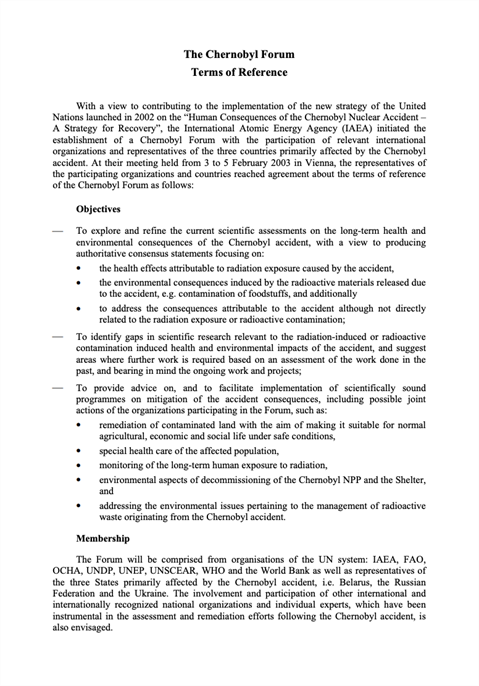The Chernobyl Forum: terms of reference

Overview
The accident at the Chernobyl nuclear power plant in 1986 was the most severe in the history of the nuclear power industry, causing a huge release of radionuclides over large areas of Belarus, Ukraine and the Russian Federation and affecting lives of millions.
In 2003 eight UN Agencies and representatives of the governments of Belarus, The Russian Federation, and Ukraine formed Chernobyl Forum – a platform to review and summarize the results of two decades of mitigation efforts and research programmes on health, environmental and socio-economic consequences of the accident.
UN Agencies have cooperated in the Chernobyl Forum in 2003-2006 :
- International Atomic Energy Agency (IAEA)
- Food and Agriculture Organization (FAO)
- UN Office for the Coordination of Humanitarian Affairs (UN OCHA)
- United Nations Development Programme (UNDP)
- United Nations Environment Programme (UNEP)
- United Nations Scientific Committee on the Effects of Atomic Radiation (UNSCEAR)
- World Health Organization (WHO)
- World Bank
The Forum resulted in two benchmark technical reports on environmental and on health consequences. These reports were developed separately and independently by the IAEA and WHO (respectively) through series of expert meetings held in 2003-2005 and launched in September 2005 at the International Conference dedicated to the completion of the Chernobyl Forum. Read the statement of the Chairman of the Forum, Prof. Burton Bennett at the launch of the WHO report.
In addition, a digest report summarizing the two technical reports mentioned above, was completed by a report of the UNDP with the focus on socio-economic consequences. In April 2006, a special UN General Assembly dedicated to the twentieth anniversary of Chernobyl, acknowledged the important contributions of the Chernobyl Forum, a collective effort by eight organizations within the United Nations system and the Governments of the most affected countries.
